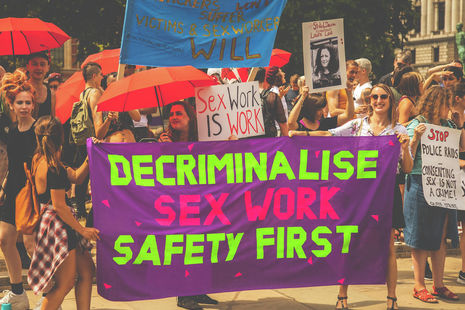Sex workers have been left behind by Covid-19 provisions
Bridie Milson discusses the plight of sex workers during Covid-19 and the government’s neglect for the erotic economy

Almost all aspects of our ‘normality’ have been affected by the Covid-19 pandemic, with many of us being forced to reevaluate our society’s values. National lockdowns have made a significant amount of industries suffer – with 1 in 20 people struggling to find a job. In this climate of government scrutiny, financial stability has been pushed to the forefront of many of our minds. But many of us do not give enough mind to the financial protection of those who are already in precarious labour markets, such as the sex work industry.
Despite the persistent demand for its services, the sex work industry has always struggled to gain recognition and acceptance within the UK. Its relevance is continuously ignored by the government when they come to finalise legislation and consider which communities would particularly benefit from economic aid. The pandemic has only highlighted this neglect.
“Despite the persistent demand for its services, the sex work industry has always struggled to gain recognition and acceptance within the UK”
The Covid-19 pandemic has exasperated the many struggles already faced by the sex worker community. National lockdowns and the enforcement of social distancing have placed considerable limitations on the opportunities for sex workers to establish clients and earn a liveable wage. Safer Wales has been running its StreetLife project to support sex workers since 2005, they have reported a 69% rise in its dealings with women since the start of the pandemic. With many returning to the industry in an attempt to secure a stable income and a rise in violent acts against workers, the government’s response to the protection and legitimisation of sex workers needs to be scrutinised.
Just over 75% of sex workers identify as female, and so the gendered nature of sex work must be taken into consideration when analysing the attitudes towards the industry as a whole. Women are conventionally expected to remain within the domestic sphere as the predominant carer; around 80% of workers are single mothers as many who are struggling to support their families seek immediate income and flexible hours. Mainstream labour markets often cannot offer this and are somewhat difficult to access due to the high levels of gender discrimination. This is particularly true for members of intersectional communities, such as disabled women, transgender women and women from ethnic minorities.
Economic difficulties faced by the sex worker community have been accentuated during the pandemic, particularly the complications and delays when receiving Universal Credit and other economic aids. Most sex workers are not registered as self-employed, thus they are not eligible for economic grants or the furlough scheme that was introduced during the pandemic. The unstable work status attached to sex work and their inability to access bank accounts or banking apps such as PayPal also means that many sex workers struggle to document their payments officially.
“In January 2021, the website OnlyFans reported an increased registration of 77 million users since July 2019. Online sex work, especially for students, allows individuals to anonymously and quickly create income without having to compromise too much of their safety”
The heightened enforcement of social distancing measures has also meant that the policing of brothels and those suspected of soliciting sex work has increased. It can be argued that the restrictions put in place, such as increased identification measures, police surveillance and more control around ‘freedom’ of movement can work to target marginalised groups such as immigrant workers as the police prey on their economic desperation and social vulnerability. Although the government has promoted the use of online adult services as an alternative, many sex workers do not have access to these facilities due to economic disadvantages or their living situation.
There has been a particular increase in the number of students relying on sex work to financially support themselves. Statistics from Save The Student show that in 2019, 6% of students would consider sex work for economic aid – this figure has since doubled. Since the pandemic has affected all areas of the labour market, fewer parents can fund their child’s university experience and there are fewer jobs available to students to economically support themselves. Covid-19 has seen a surge in the popularisation of online sex work. In January 2021, the website OnlyFans reported an increased registration of 77 million users since July 2019. Online sex work, especially for students, allows individuals to anonymously and quickly create income without having to compromise too much of their safety.
Although sex work should always be viewed as a legitimate career, it should be a choice, rather than a survival method for already vulnerable members of society. Currently, within the UK, the exchange of sex for money is legal, however many related activities such as soliciting in a public place, kerb-crawling, owning or managing a brothel and pimping are still considered illegal. By keeping these aspects of sex work illegal, the ability for workers to create a community of support and protection is made far more difficult.
The government response towards the sex worker community during the pandemic has been worryingly neglectful. However, it has allowed organisations such as the Sex Worker Advocacy and Resistance Movement, the English Collective of Prostitutes and National Ugly Mugs to demonstrate the resilience of the community by providing emergency financial aid and guides for safe practices during the pandemic. The community has proven that the groundwork for the advancement of the rights of sex workers has begun, but systematic changes still need to be enforced in order for real change to be achieved.
The complete decriminalisation of sex work in the UK and further education of those in positions of power would allow for sex workers to apply for economic and welfare aid without feeling embarrassed, scared or ridiculed. Many organisations are demanding that the government grants the same economic and employment rights to sex workers as they do to other industries. This would offer greater protection for sex workers and ensure that the discrimination against a person based on their current or former involvement in sex work is made illegal. The pandemic has forced us to analyse many aspects of the way we live, perhaps it can change our understanding of marginalised communities.
 News / University Council rescinds University Centre membership20 February 2026
News / University Council rescinds University Centre membership20 February 2026 News / Hundreds of Cambridge academics demand vote on fate of vet course20 February 2026
News / Hundreds of Cambridge academics demand vote on fate of vet course20 February 2026 News / Judge Business School advisor resigns over Epstein and Andrew links18 February 2026
News / Judge Business School advisor resigns over Epstein and Andrew links18 February 2026 News / Union cancels event with Sri Lankan politician after Tamil societies express ‘profound outrage’20 February 2026
News / Union cancels event with Sri Lankan politician after Tamil societies express ‘profound outrage’20 February 2026 News / Caius students fail to pass Pride flag proposal20 February 2026
News / Caius students fail to pass Pride flag proposal20 February 2026










